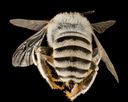Digger Bees
Anthophorini
Classification
- Phylum: Arthropoda
- Subphylum: Hexapoda
- Class: Insecta
- Order: Hymenoptera
- Family: Apidae
- Subfamily: Apinae
- Tribe: Anthophorini
Pronunciation
How to pronounce Anthophorini: /ænˌθɒfɔːˈraɪnaɪ/
These audio files are automatically generated. While they are not always 100% accurate, they are a good starting point.
Images






Summary
Anthophorini, or digger bees, are a diverse tribe of solitary bees known for their burrowing nesting habits. They are characterized by their robust, hairy bodies, short wings, and distinctive buzzing sounds while feeding on flowers. They play a crucial role as pollinators.
Physical Characteristics
Generally large (up to 3 cm), very robust, hairy bees with visibly protruding faces. Wings are often short in comparison to other bees, and the apical portion is studded with microscopic papillae. Abdomens are often banded, with many Old World species of Amegilla displaying metallic blue bands.
Identification Tips
Males often have pale white or yellow facial markings, as well as modified leg armature and hairs. Their buzz produces a high-pitched whine while hovering and feeding on flowers.
Habitat
Nests are typically burrows in the soil, found in banks or flat ground, except for the subgenus Clisodon which nests in rotten wood or pithy stems.
Distribution
Widespread globally, but very few species are found in the Neotropics. Approximately 68 species in 2 genera in the local area and about 770 species in 7 genera worldwide.
Diet
Primarily nectar and pollen from flowers.
Life Cycle
Solitary life cycle with nests containing cells for larvae that are waterproofed, but do not spin cocoons during development.
Reproduction
Solitary nesting behavior; females are responsible for nest building and provisioning the cells with food for their larvae.
Ecosystem Role
Pollinators of various flowering plants.
Collecting Methods
- Netting during foraging
- Collecting from nesting sites
Preservation Methods
- Pinning
- Drying
- In alcohol
Evolution
Once classified under the obsolete family Anthophoridae, Anthophorini are now recognized within the subfamily Apinae of the family Apidae.
Misconceptions
The common name 'digger bees' can cause confusion, as it overlaps with members of Centridini as well.
Tags
- Anthophorini
- Digger Bees
- Bees
- Solitary Bees
- Pollinators